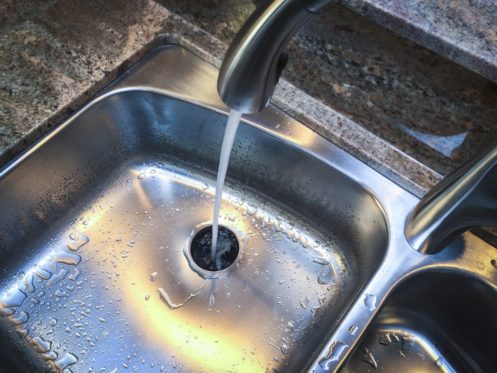A slow-draining sink is bad, and a clogged sink is even worse. But it’s not always possible to call a plumber right away, so you need to know how to do it yourself. There are several methods to fix a clogged sink, depending on the cause. Here are a few that can take care of many types of clogs with a little know-how and a couple of materials at home.
Causes of Clogged Sinks
There are many common substances that can cause your sink to clog. While each of them can cause a clog by themselves, it is typical for there to be several substances in the clog, usually with one substance that is the main cause.
Soap scum is a major clogging substance, with the minerals in hard water reacting with the soap’s fatty acids to create lime, often called soap scum. It builds up over time and not only clogs the drain but can attract mold and mildew.
Grease is another one. While pouring hot grease down the sink seems like an easy way to get rid of it, because it is liquid at the time, it eventually cools. When that happens, it solidifies and causes a clog.
Bits of food can also cause a clog. Many foods have oil, fat, and grease, which stick to the drains and pipes. Soap scum and grease add even more oily buildup, which makes the clog larger or worse. If you have a garbage disposal in your sink, there are certain foods you shouldn’t put into it, including (but not limited to): Grease/oil, clam or oyster shells, a lot of vegetable peels, or eggshells at once, cornhusks, and artichokes.
People with long hair are familiar with clogs caused by them. Everyone sheds a small amount of hair every day, and it often goes down the drain. However, long strands of hair can’t make their way through the pipes, so they may accumulate together along with soap scum and other debris, causing a clog.
Most people living in an area with hard water experience mineral deposit buildup in their pipes. Hard water has calcium, magnesium, and sometimes also iron in it. Calcium buildup is the culprit that first causes decreased water pressure, eventually leading to a clog. If you have an issue with hard water, a water treatment solution is necessary.
Some people may also experience sink clogs caused by solids. Even if there are no children around playing with small toys in the sink, older children and adults can have small items accidentally fall down the drain. Caps, jewelry, and coins are a few examples.
Effects of Clogged Sinks
Clogs can be the starting point of a variety of issues.
It is difficult to clean with less space in the sink due to standing water. Plus, the standing water itself will get dirty over time. Bacteria in your pipes can increase, leading to poorer water quality. So, in addition to unclogging your sink, you may have to purchase a water treatment solution.
Odors appear because of the clogging substances and won’t go away until the clog is resolved. Mildew will appear, as will mold, and mold is especially a health hazard. If the clogged sink starts attracting insects, you may find other creatures infesting your home from the new food source. Stains and discoloration are other negative effects on the aesthetics of your home. Stains can be difficult to remove, and discoloration may be permanent.
Leaky pipes and other structural damage can also happen as a result of a clogged sink. It can end up being far costlier when allowing it to stay over, unclogging it right away.
How to Prevent Clogged Sinks
Fortunately, you don’t have to deal with a clogged sink on a regular basis. There are some inexpensive, easy ways to keep your sink clean.
Using a mesh drain strainer or basket is by far the best prevention of sink clogs. This handy trap fits into the top of the drain and can be quickly removed for emptying into the trash and cleaning. It is also inexpensive.
Not pouring grease or flushing food scraps down the sink or garbage disposal will help a great deal as well. If you need to pour out grease, let it cool. Pour it into a metal can, then dispose of it in your trash. Remember to use your garbage disposal properly and avoid putting certain waste or a large number of scraps into it.
For maintenance of your sink drain, rinse with hot water once a week, especially if you experience frequent clogs. The hot water will keep debris moving to prevent clogs from forming. Alternately, you can first pour a cup of baking soda down the sink, followed by a cup of distilled white vinegar or lemon juice. The acid will react with the baking soda to create a foam that helps dissolve debris in your pipes or disposal. Let the foam sit for a few minutes, then follow it with hot (preferably boiling) water.
Avoid harsh chemicals to increase the life of your pipes, or at least use them sparingly. While harsh chemicals unclog pipes in the short term, they cause corrosion of pipes in the long term and can actually cause clogs.
Methods for Unclogging Sinks
Hot water is not only great maintenance for preventing sink clogs, but it can also work to break up any type of greasy clog or small clog. Fill a small pot with water and set it to boil, then pour it down the sink, waiting about a half-hour before testing the drainage. You may need to repeat it a couple more times.
For larger or more difficult clogs, you can use a few household cooking substances. Pour a cup of baking soda down the sink, followed by a cup of distilled white vinegar or lemon juice. Wait for the solution to start fizzing, then pour down a small pot of boiling water. Repeat two more times if necessary, waiting a half-hour between each time before testing.
Although plungers are typically used to unclog toilets, it is good to have a plunger dedicated to the sink. It can work to suction out clogs that are closer to the top of the drain. If your sink has an overflow hole, plug it up with a small dishrag. Use the plunger several times to unclog the sink.
If you have a clog that is caused by hair or solids, a plumber’s snake or drain snake will work best. Although it can be somewhat costly to buy one, it is a worthy investment that will quickly pull up clogging substances. You can also choose to rent one weekly or per diem for when you need it occasionally, especially if you are experiencing clogs in multiple sinks. A basic plumbing snake can cost anywhere from $15 to $100.
Sometimes, a sink clog can make it to the main sewer line or cannot be broken up or pulled out of the sink. It is at that point you’ll need to call a plumbing specialist.
Contact a Professional Plumber
Having plumbing issues in or around Gilbert, AZ? AZ Water, Drain & Sewer has years of experience as a family-owned business under our name. From drain heating and repair to plumbing maintenance, water heater installation, and more, if it’s water-related, we can most likely tackle the problem. To learn more about our services or schedule an appointment, call us at AZ Water, Drain & Sewer today!


